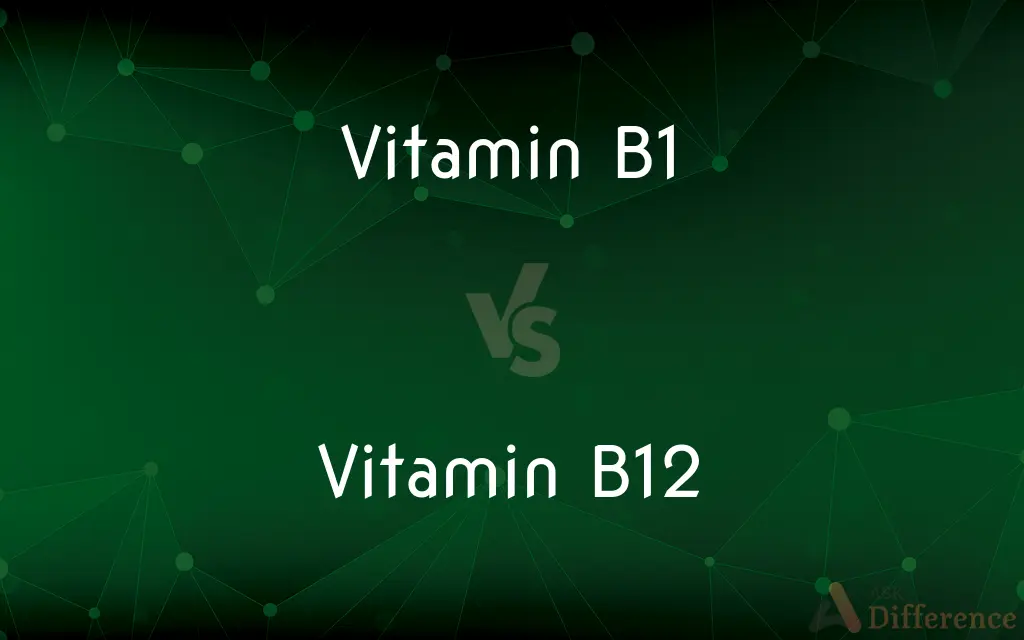Vitamin B1 vs. Vitamin B12 — What's the Difference?
By Fiza Rafique & Maham Liaqat — Published on March 8, 2024
Vitamin B1 (Thiamine) is crucial for energy metabolism and nerve function, while Vitamin B12 (Cobalamin) supports nerve health and red blood cell formation, highlighting their distinct roles.

Difference Between Vitamin B1 and Vitamin B12
Table of Contents
ADVERTISEMENT
Key Differences
Vitamin B1, also known as Thiamine, plays a pivotal role in converting nutrients into energy, essential for nerve, muscle, and heart function. Vitamin B12, or Cobalamin, is vital for neurological function, DNA synthesis, and the production of red blood cells.
Thiamine is found in whole grains, meat, and fish, becoming deficient in diets lacking these elements or in individuals with excessive alcohol consumption, leading to conditions like beriberi and Wernicke-Korsakoff syndrome. Vitamin B12 sources include meat, eggs, and dairy, and its deficiency, more common among vegetarians and the elderly, can cause anemia and neurological issues.
The body absorbs these vitamins differently; B1 is absorbed directly by the intestines and distributed throughout the body, requiring daily replenishment due to its water-soluble nature. B12 absorption involves a more complex process, requiring intrinsic factor, a protein produced in the stomach, highlighting the importance of gastrointestinal health for its uptake.
Supplementation of Vitamin B1 is often recommended for individuals at risk of deficiency, such as those with alcohol dependence or malabsorption issues, while B12 supplementation is crucial for those unable to consume or absorb it from natural sources, including vegetarians, vegans, and older adults.
Understanding the distinct functions and sources of Vitamin B1 and B12 is essential for maintaining overall health, emphasizing the need for a balanced diet or supplementation to meet the body’s requirements for these critical nutrients.
ADVERTISEMENT
Comparison Chart
Function
Converts nutrients into energy, supports nerve, muscle, and heart function
Essential for nerve health, red blood cell formation, and DNA synthesis
Sources
Whole grains, meat, fish
Meat, eggs, dairy products
Deficiency Diseases
Beriberi, Wernicke-Korsakoff syndrome
Anemia, neurological disorders
Absorption
Directly by intestines, requires daily intake
Requires intrinsic factor, stored in the liver
Key Populations at Risk
People with alcohol dependence, those with malabsorption
Vegetarians, vegans, elderly, those with gastrointestinal issues
Compare with Definitions
Vitamin B1
Found in whole grains, providing energy and supporting nerve health.
Eating brown rice helps meet my daily Vitamin B1 needs.
Vitamin B12
Requires intrinsic factor for absorption, highlighting the importance of gut health.
Gastrointestinal issues can lead to a Vitamin B12 deficiency due to absorption problems.
Vitamin B1
Water-soluble, requiring regular replenishment through diet.
I ensure to include Vitamin B1 rich foods in my daily diet for continuous energy.
Vitamin B12
Deficiency can lead to serious neurological issues, emphasizing the need for adequate intake.
Regular Vitamin B12 intake is crucial for preventing nerve damage and memory loss.
Vitamin B1
Can be lost in cooking water, suggesting minimal water use for cooking.
To preserve Vitamin B1, I steam vegetables instead of boiling them.
Vitamin B12
Crucial for red blood cell formation and neurological health.
Vitamin B12 shots are often prescribed to prevent anemia.
Vitamin B1
Essential for energy metabolism and nerve function.
I take Vitamin B1 supplements to boost my energy levels.
Vitamin B12
Stored in the liver, making deficiency symptoms slow to appear.
Despite being a vegetarian for years, my Vitamin B12 levels only recently started to drop.
Vitamin B1
Necessary to prevent beriberi and support cognitive functions.
Thiamine is critical for preventing nerve damage and maintaining mental clarity.
Vitamin B12
Predominantly found in animal products, essential for vegetarians to supplement.
As a vegan, I take Vitamin B12 supplements to maintain my health.
Common Curiosities
What are the symptoms of Vitamin B1 deficiency?
Symptoms include fatigue, irritability, reduced reflexes, and muscle weakness.
How are Vitamin B1 and B12 absorbed in the body?
B1 is absorbed directly by the intestines, while B12 absorption requires intrinsic factor and is stored in the liver.
Can alcohol affect Vitamin B1 levels?
Yes, excessive alcohol consumption can lead to thiamine deficiency by interfering with its absorption and storage.
Who should take Vitamin B12 supplements?
Vegetarians, vegans, older adults, and people with gastrointestinal issues that impair absorption.
What foods are high in Vitamin B1?
Whole grains, pork, fish, and beans are rich in thiamine.
Can Vitamin B12 deficiency be reversed?
Yes, with proper supplementation or dietary changes, Vitamin B12 deficiency can be reversed, though some neurological effects may be permanent if not treated early.
Can Vitamin B1 and B12 improve mental health?
Adequate levels support brain health, but they are not a standalone treatment for mental health conditions.
Can you get Vitamin B1 and B12 from a vegetarian diet?
Vitamin B1, yes, through whole grains and some vegetables; B12 is challenging as it's primarily found in animal products, requiring supplementation for vegetarians and vegans.
Is it safe to take Vitamin B1 and B12 supplements together?
Yes, taking B1 and B12 supplements together is generally safe and can be part of a comprehensive vitamin B supplementation plan.
What is Vitamin B1 used for in the body?
Vitamin B1 is essential for converting nutrients into energy and supporting nerve, muscle, and heart function.
How can a Vitamin B12 deficiency affect the body?
It can cause anemia, fatigue, weakness, constipation, loss of appetite, and neurological issues.
What is the recommended daily intake of Vitamin B1 and B12?
Varies by age, gender, and health status, but general guidelines can be found on health organization websites.
Why might elderly individuals be at risk for Vitamin B12 deficiency?
Due to decreased absorption capacity, reduced dietary intake, and the potential lack of intrinsic factor.
How long does it take to correct a Vitamin B12 deficiency?
It can take a few weeks to several months of supplementation to correct a deficiency, depending on its severity.
Share Your Discovery

Previous Comparison
Flat Water vs. Still Water
Next Comparison
Catholic Bible vs. NIV BibleAuthor Spotlight
Written by
Fiza RafiqueFiza Rafique is a skilled content writer at AskDifference.com, where she meticulously refines and enhances written pieces. Drawing from her vast editorial expertise, Fiza ensures clarity, accuracy, and precision in every article. Passionate about language, she continually seeks to elevate the quality of content for readers worldwide.
Co-written by
Maham Liaqat













































